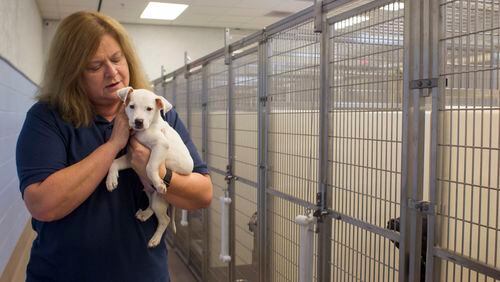The Georgia Senate is considering legislation that would prohibit local governments from regulating the sale of pets.
Animal-rights lobbyists say the measure would strip local control from cities that want to crack down on pet sales and encourage adoption instead. Canton became the first city to enact a local ban last year shortly after a puppy mill was discovered in Cherokee County.
Senate Agriculture and Consumer Affairs Committee Chairman John Wilkinson, R-Toccoa, who is sponsoring Senate Bill 418, said if a product is legal and regulated by federal or state government, municipalities shouldn't be allowed to limit their sale.
“We just don’t think that someone’s personal political agenda ought to drive what you can and can not sell,” he said. “We’re the number one place in the nation to do business and we just don’t think you ought to arbitrarily, just because you don’t like something, say you can’t operate it.”
If the bill passes, cities would not be allowed to “prohibit, ban or otherwise restrict” the sale of anything that is regulated by the U.S. Department of Agriculture, U.S. Food and Drug Administration, or the Georgia Department of Agriculture.
Republican lawmakers traditionally rail against over-regulation of business by the federal government. In this case, the bill makes clear that federal regulation would take precedence over city ordinances.
Cities began banning pet sales as far back as 2006. Since Canton instituted the ban, restrictions also have been implemented in other parts of Georgia as recently as last month, including Sandy Springs, Ball Ground and Centerville.
Last year, California became the first state to ban the retail sale of animals.
All who testified at a hearing this week spoke against the bill, which a Senate committee approved 3-2. They mostly argued that local governments are best equipped to make decisions about how businesses in their community are regulated.
Michael McPherson, a lobbyist with the Georgia Municipal Association, said when issues arise, such as puppy mills or the use of bath salts as a narcotic a few years ago, local governments were able to act swiftly.
“It was years after the first ban by cities that states took actions against those bath salts,” McPherson said.
Andy Lord, a lobbyist for the American Society for the Prevention of Cruelty to Animals, said not only is the organization concerned about the loss of local control, but believes it would keep cities from addressing health issues at pet stores.
Lord cited about 10 cases since July of sick animals that made humans ill being sold in Georgia stores.
Many animal advocates referenced a bill that failed last year to stop local government from regulating pet stores. Wilkinson stressed that his bill is different because it doesn’t single out pet stores.
“I love dogs. I live on a farm. I’ve had dogs,” Wilkinson said. “I can assure you that I’m not going to put my name on anything that I think will put the people of Georgia in danger.”
Virginia Galloway, a lobbyist with the conservative Faith and Freedom Coalition, said she worried about the unintended consequences of taking local control away from municipalities.
“We’re concerned about whether or not in the future this could be used about something that’s not about pet stores,” she said, arguing that the legislation is too broad. “You needed a mouse hole but you made a barn door.”
Wilkinson said the bill is about protecting the free market.
“Why would you want to restrict free trade of a legal product?” he said. “If you got a problem, don’t go buy it there and let the market work itself out.”
Lawmakers frequently debate strengthening or loosening trade of other legal products, such as alcohol and cigarettes.
Big pet stores across the country have been fighting such local ordinances. A group called the Georgia Market Alliance of Georgia Retailers hired top lobbying firm, GeorgiaLink, to support the bill.
In some states, the legislation has been known as Petland Bills, after the Ohio-based franchiser of pet stores that have been active in supporting measures like Wilkinson’s.
The lobby group representing Petland Inc., known as Citizens for Responsible Pet Ownership, started donating to state lawmakers at the end of 2017, giving $9,000 to 13 lawmakers over the course of a few weeks. The biggest donation, $2,000 went to the campaign fund for House Speaker David Ralston, R-Blue Ridge. Wilkinson, the bill's sponsor, received $750.
About the Author








